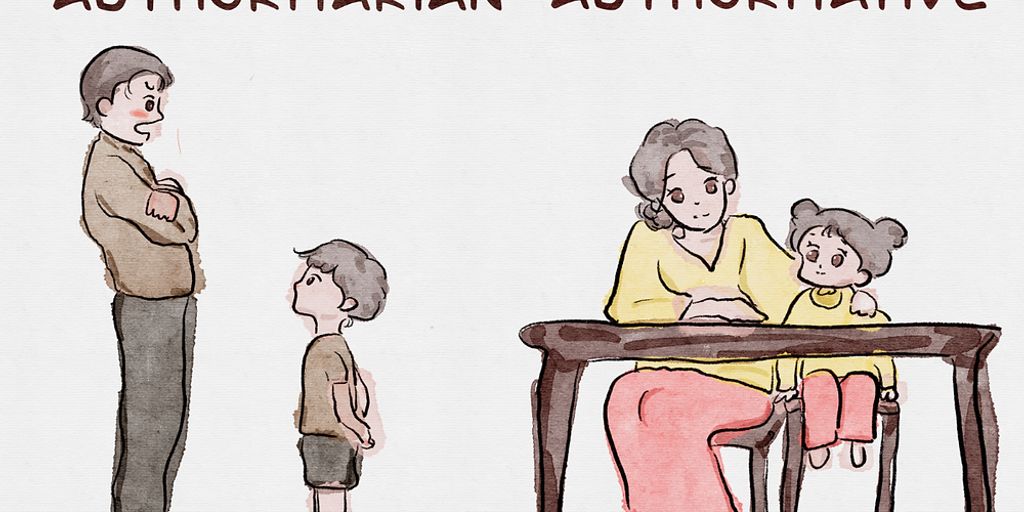
When it comes to raising kids, the way parents act and make decisions can shape their children’s future. Different parenting styles can influence how kids feel about themselves, how they get along with others, and how well they do in school. Knowing about these styles helps parents make better choices and find the best way to support their children.
Key Takeaways
- Parenting styles play a crucial role in a child’s emotional, social, and academic development.
- There are four main types of parenting styles: authoritarian, authoritative, permissive, and uninvolved.
- Each parenting style has unique traits and can affect children differently.
- Understanding your parenting style can help you make better decisions for your child’s growth.
- Cultural backgrounds and co-parenting situations can influence which parenting style is used.
The Four Main Parenting Styles
Authoritarian Parenting
Authoritarian parents are known for their strict rules and high expectations. They often demand obedience without question and provide little warmth or nurturing. Children raised in this environment may follow rules well but often struggle with self-esteem and social skills.
Authoritative Parenting
Authoritative parents balance high expectations with warmth and support. They set clear rules but also explain the reasons behind them. This style encourages open communication and fosters independence. Children raised by authoritative parents tend to be confident and socially adept.
Permissive Parenting
Permissive parents are highly involved in their children’s lives but set few boundaries. They are nurturing and communicative but often avoid enforcing rules. This can lead to children who are impulsive and lack self-discipline.
In contrast to authoritarian parents, permissive parents are highly involved and nurturing but may struggle to provide the necessary structure.
Uninvolved Parenting
Uninvolved parents are often detached from their children’s lives, providing neither guidance nor emotional support. This lack of involvement can lead to children feeling neglected and struggling with self-esteem and academic performance.
How Parenting Styles Affect Child Development
Emotional Development
Parenting styles play a crucial role in shaping a child’s emotional world. Children raised in supportive environments tend to develop better emotional regulation skills. On the other hand, those exposed to inconsistent or harsh parenting may struggle with anxiety and low self-esteem.
Social Skills
The way parents interact with their children significantly influences their social abilities. Kids who experience positive reinforcement and open communication often excel in social settings. They are more likely to develop strong friendships and effective communication skills. Conversely, children from more restrictive or neglectful homes may find it challenging to form healthy relationships.
Academic Performance
Parenting styles also have a notable impact on a child’s academic success. Supportive and involved parents often foster a love for learning in their children. These kids are more likely to perform well in school and pursue higher education. In contrast, children from less supportive backgrounds may struggle academically and show less interest in school activities.
Understanding the role of parenting styles in child development helps parents make informed choices that benefit their children’s overall well-being.
Identifying Your Parenting Style
Self-Assessment Techniques
To understand your parenting style, start with a self-assessment. Reflect on how you handle different situations with your child. Do you set strict rules, or are you more lenient? Knowing your approach can help you see if you lean towards one of the four main styles: authoritative, authoritarian, permissive, or uninvolved.
Common Traits and Behaviors
Each parenting style has its own traits. For example, authoritarian parents often have strict rules and expect obedience. Authoritative parents set rules but are also responsive and nurturing. Permissive parents are lenient and may avoid setting boundaries. Uninvolved parents might be detached and less engaged. Recognizing these traits in yourself can help you identify your style.
Seeking Professional Guidance
If you’re unsure about your parenting style, consider seeking help from a professional. A family therapist or counselor can provide insights and guidance. They can help you understand the impact of your style on your child and suggest ways to improve. Sometimes, an outside perspective can be very helpful.
Understanding your parenting style is the first step towards making positive changes. It allows you to be more intentional and effective in your approach.
Adapting Parenting Styles for Different Ages
Infants and Toddlers
When caring for infants and toddlers, it’s crucial to provide a nurturing and safe environment. At this stage, children need consistent routines and lots of physical affection. Building a strong bond through touch and eye contact helps in their emotional development. Parents should be patient and responsive to their child’s needs, as this sets the foundation for trust and security.
School-Aged Children
As children grow and start school, their needs change. They require more structure and guidance to help them navigate new social and academic challenges. It’s important to balance discipline with warmth and support. Encouraging open communication allows children to express their feelings and thoughts, fostering a sense of independence and confidence. Parents should also be involved in their child’s education, helping with homework and attending school events.
Teenagers
Parenting teenagers can be particularly challenging as they seek more independence and begin to form their own identities. It’s essential to maintain open lines of communication and show respect for their opinions. Setting clear boundaries while allowing for some flexibility can help teens feel understood and supported. Parents should also be aware of the emotional changes that come with adolescence and provide a stable environment where teens feel safe to express themselves.
Adapting your parenting style as your child grows is key to meeting their changing needs. Flexibility and understanding are crucial in helping them develop into well-rounded individuals.
Cultural Influences on Parenting Styles
Western Parenting Approaches
Western cultures often emphasize individualism and independence. Parents in these cultures may encourage their children to express themselves freely and make their own decisions. This approach can lead to a more permissive or authoritative parenting style, where the child’s opinions are valued and considered.
Eastern Parenting Approaches
In contrast, Eastern cultures often focus on collectivism and respect for authority. Parents may adopt a more authoritarian style, expecting obedience and discipline from their children. This approach is deeply rooted in cultural values and traditions, shaping how parents interact with their children.
Blended Cultural Practices
In multicultural families, parenting styles can be a blend of different cultural influences. Parents might combine elements from both Western and Eastern approaches, creating a unique style that respects their diverse backgrounds. This blending can help children appreciate and understand multiple cultural perspectives.
Understanding how cultural background influences parenting styles is crucial for family and parenting coaches. By recognizing these influences, coaches can provide more tailored and effective guidance, helping parents align their strategies with their cultural values and parenting goals.
Balancing Parenting Styles in Co-Parenting Situations
Communication Strategies
Effective communication is the cornerstone of successful co-parenting. A cooperative co-parenting relationship minimizes stress by reducing conflicts and disagreements, thereby allowing for clearer thinking and better decision-making. Regular check-ins and open discussions about parenting approaches can help both parents stay on the same page.
Consistency and Flexibility
In a recoupled family, co-parenting can be a complex but rewarding experience. Co-parenting is the act of raising a child together with another adult who is not the child’s biological parent. It is an arrangement that requires communication, collaboration, and mutual respect between both parties. While maintaining consistency in rules and expectations is important, being flexible and adapting to changing circumstances is equally crucial. This balance helps create a stable yet adaptable environment for the child.
Conflict Resolution
Disagreements are inevitable, but how they are handled makes all the difference. Establishing a conflict resolution plan can prevent minor issues from escalating. This might include setting aside time to discuss disagreements calmly or seeking the help of a mediator if needed. The goal is to resolve conflicts in a way that prioritizes the child’s well-being.
Blended parenting styles prioritize flexibility and open-mindedness. Parents who follow a blended approach recognize that no single parenting style fits every situation or child. Instead, they take the time to understand their children’s individual temperaments, strengths, and challenges. By doing so, they can tailor their parenting techniques to meet their children’s specific needs.
Long-Term Effects of Parenting Styles on Children

Self-Esteem and Confidence
Parenting styles have a profound impact on a child’s self-esteem and confidence. Children who have authoritative parents tend to show the best outcomes. They often exhibit high self-esteem and are more confident in their abilities. On the other hand, children with authoritarian parents may struggle with low self-esteem and self-worth.
Mental Health
The mental health of children is also significantly influenced by parenting styles. Authoritative parenting is linked to lower levels of anxiety and depression. Conversely, children with permissive parents might face higher levels of anxiety and struggle with emotional regulation. This can leave a lasting impact on children, affecting their mental well-being into adulthood.
Career and Life Choices
Parenting styles can shape a child’s future career and life choices. Children raised by authoritative parents often have better academic performance and are more likely to pursue higher education. They tend to have clear goals and a strong sense of direction. In contrast, children with permissive parents may lack the discipline and motivation needed to achieve their career aspirations.
Understanding the long-term effects of different parenting styles can help parents make informed decisions that benefit their children’s future. By adopting a balanced approach, parents can foster a positive environment that supports their child’s overall development.
Conclusion
Understanding different parenting styles is key to helping parents make better choices for their children. Each style, whether it’s authoritative, permissive, authoritarian, or uninvolved, has unique effects on a child’s growth and behavior. By learning about these styles, parents can find the best ways to support their kids’ emotional and social development. This knowledge not only helps in raising well-rounded children but also strengthens the parent-child relationship. In the end, being aware of how parenting styles impact children can lead to healthier and happier families.
Frequently Asked Questions
What are the main types of parenting styles?
The main types of parenting styles are Authoritarian, Authoritative, Permissive, and Uninvolved. Each style has different approaches to discipline, communication, and expectations.
How do parenting styles affect a child’s development?
Parenting styles can shape a child’s behavior, self-esteem, and overall development. For example, authoritative parenting often leads to children who are confident and socially skilled, while authoritarian parenting can result in children who are obedient but may have lower self-esteem.
Can a parent use more than one parenting style?
Yes, many parents use a mix of different parenting styles depending on the situation. It’s common to adapt your approach as circumstances change.
Why is it important to understand your parenting style?
Knowing your parenting style helps you understand how your behavior affects your child. It allows you to make informed decisions and develop strategies that align with your parenting goals.
How can I identify my parenting style?
You can identify your parenting style through self-assessment techniques, observing your behaviors, and seeking feedback from others. Professional guidance can also provide insights.
Do cultural backgrounds influence parenting styles?
Yes, cultural backgrounds can greatly influence parenting styles. Different cultures have unique beliefs and practices that shape how parents raise their children.






